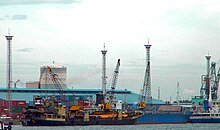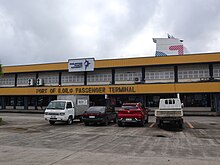Visayas Container Terminal
It is one of the busiest ports in the country, recording 78,679 ship calls, 4 million metric tons in cargo throughput, and 7.6 million passengers in 2023.
History

The Port of Iloilo has been a hub for international shipping since 1855, facilitating the export of sugar and fertilizer to global markets. Its opening to the world market on September 29, 1855, by Queen Isabella II of Spain, revitalized the local economy following the decline of the textile industry. With the inauguration of the Suez Canal in 1869, trade with Europe, particularly the United Kingdom, became more accessible. Nicholas Loney, the U.K. consul, played a pivotal role in this development, and Muelle Loney, the quay along the Iloilo River, is named in his honor.

The rise of the sugar industry spurred an economic boom in Iloilo and its neighboring island, Negros. Iloilo emerged as a leading center of commerce and trade in the Visayas and Mindanao, second only to Manila. Serving as the primary deep-water port for both Iloilo and Bacolod, the capital of Negros Occidental, located 35 miles away across the Guimaras Strait, it handled nearly all sugar and rice trade from Negros during the late 19th and early 20th centuries.
In 2024, International Container Terminal Services, Inc. (ICTSI) secured a 25-year concession deal to develop and manage the Iloilo Commercial Port Complex. As part of this agreement, ICTSI renamed the facility Visayas Container Terminal (VCT).
Location
The Iloilo harbor is situated within the Iloilo Strait, delineated to the north by a line extending from the Dumangas River across the Iloilo Strait to Navalas Point on Guimaras Island, and to the south by a line stretching from Lusaran Point on Guimaras Island to Surraga River in the municipality of San Joaquin on Panay Island.
Profile

The Port of Iloilo, considered the primary trading hub and commercial center for Western Visayas, stands out as one of the safest natural seaports in the Philippines. Spanning 20.8 hectares (51 acres) of reclaimed land, the Iloilo Commercial Port Complex boasts extensive facilities, including 11,400 square metres (123,000 sq ft) of operational space, complemented by an additional area of 97,000 square metres (1,040,000 sq ft), equipped with a crane, 348 metres (1,142 ft) of rails, roll-on-roll-off support, a 7,800-container freight station, and a 720-square-metre (7,800 sq ft) passenger shed. With berth dimensions of 400 metres (1,300 ft) in length, 26.26 metres (86.2 ft) in width, and a berthing depth of 10.50 metres (34.4 ft), the port complex caters to vessels navigating international routes.
Several shipping firms utilize the Port of Iloilo, such as Lorenzo Shipping Corporation, 2GO, Amigo Shipping Company, New Panay Shipping Company, Sulpicio Lines, and Trans-Asia Shipping Lines Inc. Fast ferries operate on the Iloilo-Bacolod route eight times daily, while 2GO inter-island overnight ferries connect to Manila, Bacolod, Cebu, Zamboanga and Cagayan de Oro. Fiberglass-made ferries ply the Iloilo Strait to Guimaras throughout the day and offer special trips at night.
Roll-on/roll-off ferry service, or RO-RO, is available between Iloilo City and Guimaras, while the RO-RO to Negros departs from Dumangas, Iloilo, 20 kilometres (12 mi) northeast of Iloilo City.
In 2017 statistics record, the port ranks third in terms of ship calls, with 11,853 recorded, fourth in cargo throughput, totaling 491,719 million metric tons, and fourth in passenger traffic, serving 2.4 million passengers.
Shipping firms and destinations
Facilities
The port provides bunkering facilities, offered by Pilipinas Shell, Caltex Philippines Inc., Petrophil Corp, and Petroleum Corp. As a key port in Western Visayas, the Commercial Port Complex (now renamed as Visayas Container Terminal) sits on reclaimed land in Lapuz district and is equipped with modern infrastructure.


The port is mainly divided into the following:
- Iloilo International Port (Visayas Container Terminal, formerly known as Iloilo Commercial Port Complex) - Loboc, Lapuz
- Iloilo Domestic Port (formerly the Old Foreign Pier) - Parola, Iloilo City Proper
- Iloilo River Wharf/Lapuz Wharf (RoRo and Fastcraft Terminal) - Lapuz Norte, Lapuz
- Guimaras-Iloilo Ferry Terminal (Jetty/Motor Banca Terminal) - Parola, Iloilo City Proper
- Ortiz Wharf (Old Jetty/Motor Banca Terminal) - Ortiz, Iloilo City Proper
| Year | Ship Calls | Container Volume (TEU) | Cargo Tonnage (mT) | Passengers |
|---|---|---|---|---|
| 2015 | 11,224 | 137,463 | 3,347,648 | 1,823,371 |
| 2016 | 12,307 | 151,817 | 3,574,575 | 2,237,811 |
| 2017 | 12,592 | 162,290 | 3,758,453 | 2,402,748 |
| 2018 | 13,315 | 165,759 | 3,984,649 | 2,547,596 |
| 2019 | 19,162 | 171,025 | 4,130,055 | 3,124,361 |
| 2020 | 14,990 | 154,234 | 3,768,905 | 1,105,572 |
| 2021 | 49,458 | 157,953 | 4,208,456 | 3,109,498 |
| 2022 | 63,093 | 167,962 | 4,446,275 | 5,962,999 |
| 2023 | 78,679 | 150,889 | 4,038,984 | 7,566,772 |
Data
| Type | m |
|---|---|
| Old foreign pier | 17,000 |
| River wharf | 68,000 |
| Iloilo Commercial Port Complex | 208,000 |
| Back-up area/commercial | 97,000 |
| Operational area | 111,000 |
The Port of Iloilo also offers open storage facilities, data listed below:
| Type | m |
|---|---|
| Old foreign pier open storage | 9,200 |
| River wharf open storage | 8,682 |
See also
References
- ^ "UNLOCODE (PH) - PHILIPPINES". service.unece.org. Retrieved 26 April 2020.
- ^ "Statistics | Philippine Ports Authority Official Website". www.ppa.com.ph. Archived from the original on 2023-12-01. Retrieved 2024-04-26.
- ^ PORT OF ILOILO - General Information
- ^ "Statistics | Philippine Ports Authority Official Website". www.ppa.com.ph. Retrieved 2024-04-26.
- ^ Sonza, Demy. "The Port of Iloilo: 1855 - 2005". Graciano Lopez-Jaena Life and Works and Iloilo History Online Resource. Dr. Graciano Lopez-Jaena (DGLJ) Foundation. Archived from the original on 2016-01-19.
- ^ Funtecha, Henry (2006-07-21). "Iloilo's position under colonial rule". thenewstoday.info. Retrieved 2019-07-29.
- ^ Iloilo City - History Archived January 20, 2008, at the Wayback Machine
- ^ Linn, Brian McAllister (2000). The Philippine war 1899-1902. Lawrence, Kansas: University of Kansas. p. 73. ISBN 0-7006-1225-4.
- ^ Chambers, Sam (2024-01-30). "ICTSI wins concession to develop Philippine box terminal". Splash247. Retrieved 2024-04-26.
- ^ "ICTSI to develop Visayas Container Terminal in the Philippines". Retrieved 2024-04-26.
- ^ "Port of Iloilo Archives - Mac-Nels Vietnam - Your Cargo? Never say never". Retrieved 2024-04-26.
- ^ "Statistics | Philippine Ports Authority Official Website". www.ppa.com.ph. Archived from the original on 2023-12-01. Retrieved 2024-04-26.
- ^ PORT OF ILOILO - Destinations
- ^ "Visayas Container Terminal | ICTSI". www.ictsi.com. Retrieved 2024-04-26.

